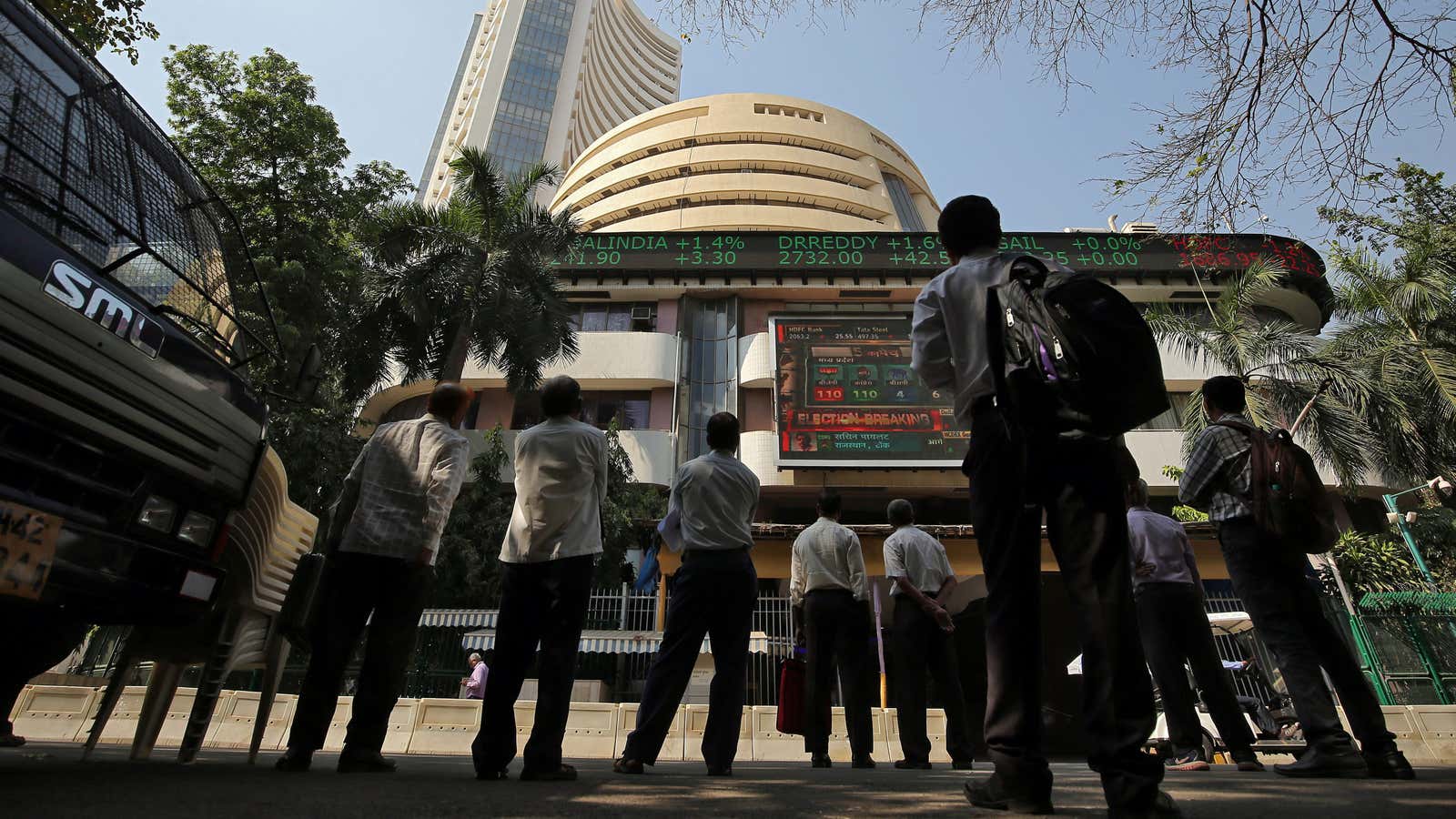If stock brokering businesses were the benchmark for India’s economic success, no one would believe that the country is going through its worse financial crisis in decades.
Over the last year, as India struggled with Covid-19 outbreaks, the country’s economy went into a recession, the unemployment rate spiked sharply, and thousands of households were pushed into poverty. Many small businesses are currently hanging by a thread.
Away from this gloom and doom, stockbrokers in India have raked in millions during the pandemic.
In the financial year that ended on March 31, 2021, the stock brokerage industry in India clocked an income of Rs27,500-28,500 crore ($3.6 billion), which is around 30-35% higher year-on-year, according to rating agency ICRA.
This growth is the result of millions of Indians entering the stock market for the first time, lured by the record highs that both the BSE’s benchmark index Sensex and the National Stock Exchange’s Nifty touched during the last 12 months. In addition, as the Reserve Bank of India drastically slashed interest rates to arrest the economic slump, traditional saving instruments such as bank fixed deposits became less lucrative. And with thousands of Indians locked indoors through most of 2020, many took interest in the stock market, trying to learn about investing on platforms such as YouTube and Instagram.
In 2020, a record 14.2 million new demat accounts were opened in India.
“We launched equities trading on our platform in June (2020) and instantly witnessed huge demand,” said Harsh Jain, co-founder of online investment platform Groww. “We currently have around 20 lakh demat accounts. These are all mostly new and young investors.” Groww recently became a unicorn when it raised $83 million in funding led by Tiger Global.
In April, the Central Depository Services (CDSL), where assets like stock, bond, and ETF are stored, said it had become the first depository in India to have over 3 crore demat accounts.
Meanwhile, trading turnover on Indian stock markets has risen by around 300% since March 2020.
With their businesses in the green, stockbroking firms have also become a rare industry that is creating new jobs at a time when many other sectors are faced with a serious unemployment problem.
Job creation in a pandemic year
Mumbai-based brokerage firm Motilal Oswal Financial Services (MOFS) added more than 1,100 employees between March and December 2020, according to the company’s investor presentation (pdf). The new additions were across teams, including wealth management, equity dealing, and sales.
“With the stock market soaring new heights, it was a great year for us. The business grew at a stellar pace which led to an increase in hiring,” said Sudhir Dhar, executive director and head of HR at MOFS.
One of India’s leading and oldest broking firms, Sharekhan, added more than 100 employees during the financial year 2021. “The majority of hiring has been in sales due to the demand for account opening. Also, the industry is going through the digitisation phase, so we hired more IT staff,” said Jaideep Arora, CEO, Sharekhan.
While job creation by the industry is great news given the overall unemployment problem, the growth of brokerages may taper in the near term.
Covid-19 and Indian stock markets
Indian stock markets are already correcting from their all-time highs with risks such as slower-than-expected economic recovery and surging Covid-19 cases looming large. This trend may spook some retail investors and deter new ones from taking the plunge into equities.
“Going forward, the outlook for the brokerage industry is cautiously stable,” Samriddhi Chowdhary, vice president and co-head of financial sector ratings at ICRA said. “While the industry is expected to clock a healthy growth on an aggregate basis, the traction witnessed in FY2021 is expected to moderate in the next fiscal.” The ongoing investor exuberance is expected to gradually wane, Chowdhary said, and the trading volumes will cool off to some extent.
The fall in stock prices means fewer debutants would be drawn towards the equities this year.
“There is an element of cyclicality to new demat account openings and it fluctuates with the market,” said Arora of Sharekhan, recalling that the industry had witnessed similar strong growth between 2003 and 2008 when there was a strong bull run and then growth slowed post the financial crisis.
While he expects the growth to moderate this year, Arora is confident that the industry will continue to grow in the long run because of factors such as digitisation, growing awareness about equities, diversification of saving, and a low-interest-rate environment.
